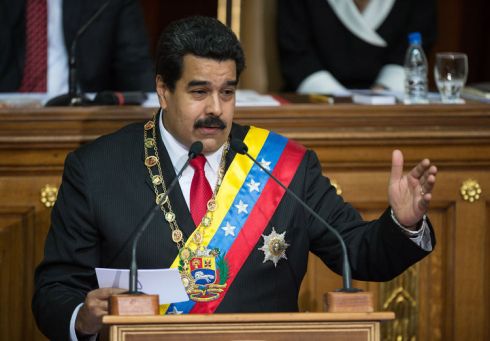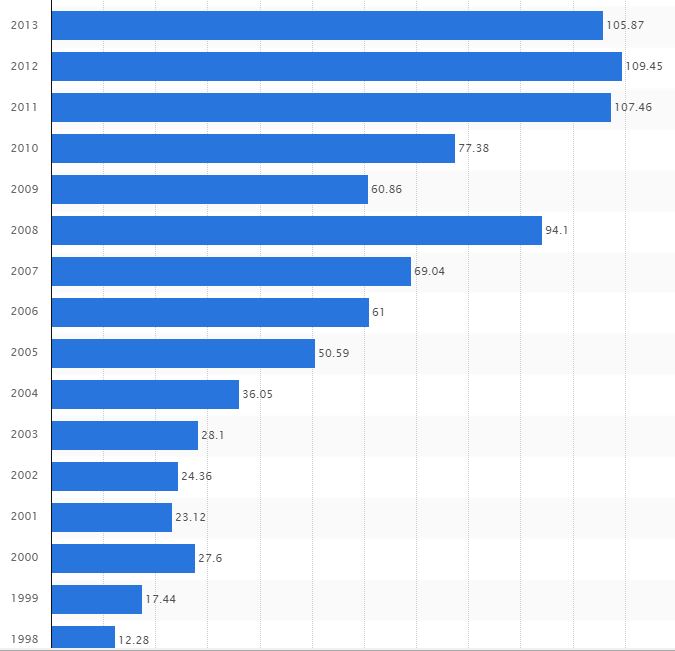Venezuela means, today, state of chaos. Its economy is collapsing in firm terms and its population faces what can be considered as the first humanitarian crisis in an oil exporter State. Hugo Chávez administration (1999-2013) basically drained all the possible means to sustain his project of power.
It’s been a historical consensus that Venezuela’s dependency on Oil is also its biggest weakness over the past governments, because, instead of using the income from the Oil selling to build a national industrial complex and start producing its own goods, developing technology, research, etc, Venezuela kept using all the income to import everything needed.
This double-dependency scenario (selling Oil to buy everything, while producing almost nothing) works well when the Oil Barrel is expensive. Exactly what happened during Chávez administration as we can see below:
1 – Average annual OPEC crude oil price (USD/barrel)
Source: LINK
Chávez was able to sustain a Welfare-like model of macroeconomic administration, focused on fighting the social inequality by directly financing projects in Caracas and other cities. Of course one of the conditions to have everything settled was the maintenance of power at all costs. Chávez always empowered himself as a self-denominated savior, which could bring prosperity to Venezuela.
Like many other dictatorships, he was careful enough to revive what could be considered a national symbol, at his own terms, Simón Bolivar’s memory in order to make a tangible hero against the oppression of the rulers. Unmistakably move, taken from Marxist level (such as the Dependency Theory of international politics) easily putting Venezuela as a victim, and also by that, justifying its means to a dangerously level of hatred spreading speech and aggressive acts towards its neighbors (Colombia and Guiana).
With Chávez death in 2013, Nicolás Maduro took his place, but without the ability to build himself an image like his predecessor. To sum up with the chaos that was the outcome of social convulsions and a tremendously hard-to-accept elections (referendum if you like better) Maduro has to deal with the drop of Oil prices in record time, leaving less and less income. As pointed out in an excellent article in Foreign Policy[1]:
“The Chinese issue looms large. China’s loans to Venezuela — close to about $18 billion, according to Barclay’s – consist of short-term financing payable via oil shipments. As the price of oil collapses, Venezuela needs to ship more oil to China in order to pay them back. Barclay’s estimates that right now this is close to 800,000 barrels per day, leaving little more than a million barrels per day Venezuela can sell for cash”
This is exactly the point. China has also secret terms agreements with Venezuela, not only related to Oil and cash, but also to security and regional interests. This whole scenario decreased the social conditions in Venezuela so much that regional elections in 2015 caused a mass defeat in the legislative for Maduro, meaning the beginning of the end. This end will surely come with a default, which will break the assets of the ones who profit with the high risks in Wall Streets and international markets.
The default is the answer now to start a new Venezuela. For sure that will be needed not only patience, but strong support from the international community to help rebuilding the economy and to demand a primary foundation from the next government. It is not only important, it is necessary for the sake of the future, that Venezuela can build its democracy and a good industrial base to prevent the Oil-dependency that has been ravaging the people since independency.
A stable Venezuela is important for South America to be secured against foreign intromission and for the region to grow together, without losing time (because money can be recovered) in fights and speeches.
[1] “Venezuela Is About to Go Bust” BY Juan C. Nagel http://foreignpolicy.com/2016/02/05/venezuela-is-about-to-go-bust/

